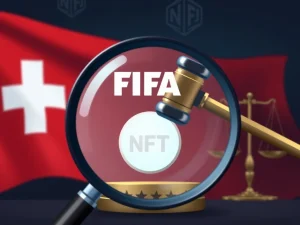Shocking Nike NFT Lawsuit Seeks $5 Million After RTFKT Shutdown

The world of digital collectibles is facing legal challenges, and sportswear giant Nike is now at the center of a significant one. A proposed class-action lawsuit has been filed against Nike, seeking $5 million in damages related to the company’s shutdown of its NFT platform, RTFKT. This Nike NFT lawsuit brings several key issues to the forefront for the crypto and digital asset community.
Why is Nike Facing a Crypto Lawsuit?
The lawsuit, filed in a Brooklyn federal court, alleges that Nike effectively conducted a ‘rug pull’ by shutting down its RTFKT platform in January. Lead plaintiff Jagdeep Cheema and other RTFKT users claim they suffered significant losses after investing in Nike’s sneaker-themed NFTs. They argue that Nike heavily promoted these digital assets using its brand power, leading investors to believe in their future value and utility.
Key claims made in the lawsuit include:
- The NFTs were unregistered securities, sold without proper registration with the SEC.
- Nike’s marketing efforts artificially inflated the perceived value of the NFTs.
- The sudden RTFKT shutdown caused a collapse in NFT prices and removed promised utility (challenges, quests).
- Nike violated consumer protection laws and state unfair trade practices.
The suit contends that the value of these Nike NFTs was tied directly to Nike’s marketing and the platform’s success, fitting the description of investment contracts under securities law.
What Happened After the RTFKT Shutdown?
Nike acquired RTFKT Studios in 2021, a firm known for creating virtual sneakers and digital assets. Holders of the resulting Nike RTFKT NFTs were told these tokens could be traded and used for interactive experiences like challenges and quests, which could lead to rewards.
However, following the RTFKT shutdown, the lawsuit claims investors were decimated. Data from OpenSea cited in the complaint shows a dramatic decrease in value:
- Nike’s crypto kick NFT collection traded for an average of 3.5 Ether (around $8,000) when listed in April 2022.
- By April 2024, these same NFTs were trading for around 0.009 Ether (roughly $16).
This sharp decline in value, coupled with the removal of promised utility from the platform closure, forms the basis of the damages claimed by the plaintiffs.
Are NFTs Securities? The Core of the Debate
A central point in many crypto-related legal cases, including this one, is whether NFTs should be classified as securities. A definitive ruling from a US court on this matter is still pending.
Crypto marketplace OpenSea recently urged the SEC to exclude NFTs from federal securities laws, arguing they do not meet the legal definition. However, the plaintiffs in the Nike case argue that the court doesn’t necessarily need to make a broad ruling on the legal status of NFTs to address their specific complaint against Nike’s actions and alleged misrepresentations.
The Impact of the Nike RTFKT Case
This lawsuit is significant because it targets a major global brand’s foray into the NFT space. It highlights the risks investors face when purchasing digital assets tied to specific platforms or brands, especially concerning promised utility and potential platform closures.
The case will likely explore the extent of Nike’s responsibility for the value and utility of the NFTs sold through RTFKT and whether their marketing practices constituted the promotion of unregistered securities. It also underscores the ongoing uncertainty surrounding the legal classification of NFTs and digital collectibles.
Summary: What This Means for the NFT Market
The Nike NFT lawsuit seeking $5 million in damages following the RTFKT shutdown is a critical development for the digital asset market. It serves as a stark reminder of the volatility and legal complexities inherent in the space. As courts continue to grapple with the classification of assets like NFTs, cases like this will help shape future regulations and investor protections. For now, it underscores the need for caution and clear communication from companies entering the Web3 realm.









